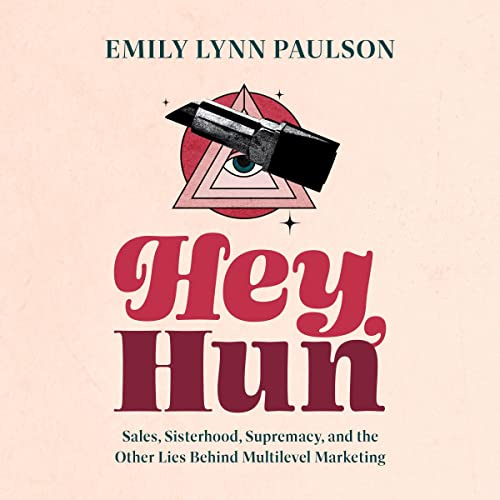Hey, Hun: my multiple MLM failures and "what it takes" to succeed in multi-level marketing
Hint: Hard work is not the issue.
I signed up for my first MLM at the age of 17, a few months shy of the legal age to sign a contract. I’d tagged along with my stepmother and her church friend to a sales convention for a large, well-known skincare and cosmetics company, and before the end of the meeting, I was sold on this Exciting Career Opportunity!
Sure, I was headed to college in the fall, but what of it? College felt like the next logical step after high school, plus a chance to get out from under my parents’ watchful eye, live on a cool campus, and do grown-up things like write in coffee shops - but I wasn’t actually all that sold on the “education” part. I was eager for life to get started, which (for me) didn’t seem like sitting in a classroom for four more years, so the combination of skipping ahead to the career part by becoming “my own boss” and an expert “skin care consultant” was hard to resist.
I didn’t consider the fact that all of my friends were recent high school graduates, like me; that we worked part-time minimum-wage jobs and and had the beauty-care budget to show for it. We mostly washed our faces with Noxema and Clearasil, tossed in the cart while our parents were grocery shopping; we adorned our lashes and lids with Wet & Wild and Cover Girl. My friends wouldn’t be regular customers, and certainly not my recruits.
Also, I had literally no network outside of my teenaged pals. I didn’t belong to a church or civil groups; I had no office to go to. My opportunities to “warm chatter” - the phrase used for talking up strangers and converting them to customers, cringe, or, better still, consultants, yikes - were limited: I didn’t go anywhere where my potential customers might be hanging out. Because, well, I was seventeen years old.
But never mind those pesky details! Dazzled by the hoopla of the event, the motivational language, and the blue-eyeshadow-bedecked sales director who riveted the room with her inspirational speech about changing women’s lives through cosmetics and community, after the speech was over, I asked my stepmom’s friend if I could sign up. “You aren’t eighteen yet, so technically you can’t sign a contract,” she said. But this woman was eager to grow her downline, sooo… “Let’s go ask if we can make an exception.”
Clutching my arm, she steered me through the crowd, right up to Herself, the sales director, whose name was, I believe, Reva. A middle-aged Texan with spiky blonde hair and lashes crusty with layers of mascara, Reva heartily approved my ambition. She winked one heavy eyelid at me - for a second, I wondered if she would be able to open it back up again - and signed her name on the contract, right under mine.
I was in.
I won’t bore you with too many details of my failed MLM attempt, because I know it probably sounds a lot like the stories of the reported 95% of people whose MLM efforts fail. But here’s what I will say: I worked hard.
I meticulously scoured the sales literature and memorized the names of different formulas.
I set up my products - the starter kit, as I recall, was around $200, paid for by my stepmom - and learned all the specs and features of the five-step skincare system, from “cleanse” to “protect.”
I learned how to “give a facial” without, for legal reasons, touching a customer’s face (this is just as confusing as it sounds).
I called friends and family, held parties, and even hit up some new acquaintances in my college dorm (which made me just about as popular as you can imagine.)
But, unsurprisingly, I was not a runaway success; and the plaintive sound of my upline’s voice on my dorm-room machine, checking in on me week after week as, discouraged, I started dodging meetings in favor of hanging out with my friends, became an anxiety-laden shadow over of my freshman year.
That didn’t stop me from trying the same company again (plus a couple other MLMs for good measure) as a young mom. This time around, now a few years wiser (and of legal age to sign a contract, of course) some of the things I’d glossed over the first time around started to bug me.
How come the companies claimed I owned my own business, yet they got to control everything from pricing to how I sold - including what I could wear to home parties?
I went to a few sales meetings in the homes of local directors. One in particular looked like a store inside, with thousands and thousands of dollars in product on display. There’s no way she’ll ever sell all this, I thought, remembering how I had been told that I didn’t need to invest in inventory yet was later pressured to buy product (which I, also, would be unlikely to sell very quickly) to rise up to the next level. At meetings, all our talk about earnings seemed to be missing some key information that as a business owner I now know to be crucial: namely, expenses.
And when it came to the recruiting piece, some of the tactics and mindset started to seem not just predatory, but illogical. We were led to feel obligated to hard-sell this “opportunity” to any and all women we encountered regardless of how satisfied they were in their current careers. Not to do so would be doing them a disservice, as they’d forever be stuck in the unrewarding hamster wheel of their current career.
Following this logic, one would think the goal was to create a world in which there are no female doctors, engineers, scientists, accountants, or CEOs because everyone would be out selling skincare products. It didn’t make any sense. Who would be the customers? And, come to think of it, who would actually run the company?
In my mid-20s I decided to scratch my itch for flexible, creative work by becoming a freelance writer, and after seeing success, all temptation to join an MLM dissolved. I could now see how sustained hard work - combined with a straightforward means of doing business and the freedom to do things my own way - actually could lead to success.
I spent some time reflecting on my MLM days this week, after reading Hey, Hun: Sales, Sisterhood, Supremacy, and the Other Lies Behind Multilevel Marketing by
on the recommendation of my smart friend, Amy Clark of the Book Gang podcast. It’s a compelling and fast-moving read about Paulson’s experience rising to the top as a sales director for the skincare brand she refers to as “Rejuvinat” (with a bit of Googling, it wasn’t hard to figure out the real company.)Over the years, I’ve occasionally done deep-dives on MLM-critical content, like the website PinkTruth.com website and season 1 of The Dream podcast. But I’d never felt so immersed in the inside story of someone who rose to success inside one of these companies - probably because those who drop out or fail feel too sheepish to tell the world about it, and those who succeed keep milking that cash cow as long as they can - or, if they leave, stay pretty quiet about their reasons why.
Paulson’s story is unique in that, up until her termination, she remained a success story (from the company’s perspective, anyway.) She was making tens of thousands of dollars a month at the height of her reign, and still around $10,000/month at the end, even after she’d completely checked out of the company and stopped doing any work at all.
But her personal life was a mess. Paulson has written openly in the past about her sobriety journey, so I expected drunken escapades to be part of this story - but had no idea how much of it there would be. I’ve hung out with some hard-drinking crowds and have been to many women’s conferences in which cocktail hours and late-night wine are part of the experience, but reading about the world Paulson describes of morning-until-night boozing actually gave me anxiety. (In an ironic twist, Paulson actually got a DUI the same night she “earned” her “free” company car. IN THE CAR.)
For years, her drinking numbed the embarrassment she would have felt, sober, about her aggressive sales and recruiting techniques (mostly recruiting, because in the MLM world, once you’ve risen up the ranks high enough, sales is a relatively small part of the success model.) Sober, that shame eventually killed her enthusiasm, but the dependence on the MLM’s social network and affirmation made it difficult to leave.
Paulson is upfront about the fact that as an affluent, pretty, white lady, she was set up for MLM success in a way many (most?) other women are not. It’s probably what made it possible for her to speak openly about the experience, as well: when she finally decided to get out, Paulson had the opportunity to sell her downline to another consultant - which would have required her to sign an NDA promising to never publicly badmouth the company.
Paulson refused, presumably because she could walk away from the money that deal would have offered her. I can only imagine how many other MLM reps have left under very different circumstances who are restricted from telling their stories now - or simply don’t have the platform that affluence and privilege enables. Reading her book I found myself wishing I could also hear from marginalized or less-affluent women who experienced their MLM exit differently. Perhaps more will come forward now?
As a young woman, my multiple MLM failures led me to question whether I really had what it took to run my own business. At the time, I wasn’t able to see that within the MLM structure, I was unlikely to succeed no matter how hard I worked. Turns out, I didn’t “have what it took” to succeed in MLM: a huge well of resources to draw from, and the ability to suspend skepticism and embarrassment to keep the machine turning.
I feel fortunate that, in those days, I had so little to invest. I might have set aside my doubts and even powered through shame if I’d had the one thing I really needed to succeed: access to lots of cash or credit. But as I had neither, I never got in too deep.
Mostly, I’m glad I gave myself another shot at “the dream” - working truly for myself, without a complicated network structure and shady business model getting in the way. After reading Hey Hun, I can only imagine how many demoralized women are out there now, laboring under the delusion that they just didn’t work hard enough, or worse, don’t have what it takes to succeed.
If you’re one of them, remember this: you almost certainly DO have “what it takes” to succeed at something you love.
But “what it takes”? It may not be what you think it is.








I hadn't heard of this book! I was going to suggest you listen to "The Dream" podcast, but then I kept reading and you already have. :)